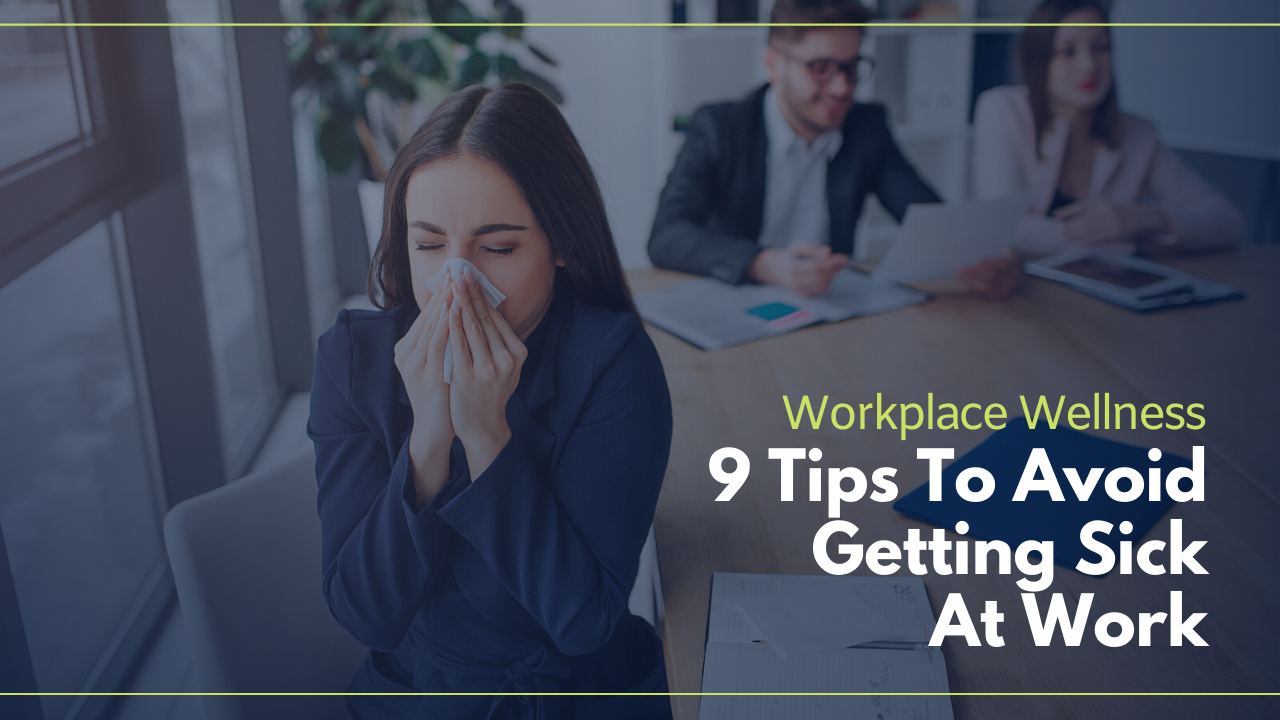- These simple measures will help to reduce your chances of getting sick in the workplace.
- The workplace is a breeding ground for bacteria, particularly shared offices and coworking spaces.
- From washing your hands (correctly), to managing stress, these 9 tips will help you — and your coworkers — stay healthy at work.
Flu season is nearing its peak and although there is no foolproof way to avoid all viruses and bacteria, there are some things you can do to reduce your chances of getting sick during flu season — and all year round.
The Workplace and Germs
Whether you work from a corporate office, a coworking space, or a coffee shop, the fact is that you’re likely exposed to a plethora of bacteria, including heterotrophic bacteria, e coli, helicobacter pylori, pseudomonas aeruginosa, and Staphylococcus aureus.
(Not so) fun fact: collaborative workspaces in particular are a breeding ground for all sorts of bacteria.
Though you might think that steering clear from those who are sick is a good strategy, this might not be the case as research has found that the dirtiest spots in the workplace are:
- Keyboards
- Microwave buttons and handles
- Coffee makers
- Refrigerator handles
- Toilet seats
Even though most workplaces are cleaned on a daily basis, the fact is that they’re not sterilized. And to be honest, we don’t really expect that. Therefore we’re left to our own habits to prevent getting sick at work. After all, you can’t just wear a Hazmat Suit to work every day during flu season.
9 Tips to Avoid Getting Sick at Work
1. Wash your hands regularly
Don’t just wash your hands, but make sure that you’re doing it the right way (most of us don’t). Below are the CDC’s instructions on how to correctly wash your hands.
- Wet your hands with clean, running water (warm or cold), turn off the tap, and apply soap.
- Lather your hands by rubbing them together with the soap. Lather the backs of your hands, between your fingers, and under your nails.
- Scrub your hands for at least 20 seconds. Need a timer? Hum the “Happy Birthday” song from beginning to end twice.
- Rinse your hands well under clean, running water.
- Dry your hands using a clean towel or air dry them.
Ideally, you should be washing your hands before and after you prepare food and eat; after using the toilet; after blowing your nose, coughing, or sneezing; after touching an animal; and after touching garbage.
2. Get some fresh air
This is especially important if someone who’s sick came into the office or if you feel that your workplace is not well ventilated. To get some fresh air, you can crack a window open or simply go outside for a short walk.
3. Keep Lysol and hand sanitizer handy
If several of your coworkers seem to be sick, then keeping disinfectant products handy can be a good strategy, especially if you work in a shared workspace environment.
Use an alcohol-based hand sanitizer if there is no soap available or if you’re short on time. When there seems to be a flu or cold outbreak in the office, consider using it whenever you shake hands with others or after handling something that has passed through various people.
4. Keep your hands off your face
This can be a hard one, especially if you’re used to rubbing your eyes, using your hand to support your face, if you regularly find yourself pushing hair out of your face, or if you have a habit of biting your nails.
Keeping your hands off your face is important because viruses and bacteria can easily spread through your mouth, nose, and eyes. Bear in mind that some viruses can survive for up to eight hours on surfaces, which is why washing your hands regularly is of utmost importance.
5. Reduce and manage stress
Stress has been proven to weaken the immune system. If you’re too stressed, then you are much more susceptible to getting sick.
Making some time to destress and to take care of yourself is a great way to avoid getting sick, not only during the flu season, but also all year round.
Some effective strategies to manage and better cope with stress include:
- Deep breathing
- Creating a third space
- Going outdoors
- Eating healthy, balanced meals
- Talking to a friend
- Sleeping it out
You can read more about how to better manage workplace stress here.
6. Catch enough Zzzs
Studies have shown that lack of sleep can negatively affect the immune system. To make matters worse, if you’re not sleeping enough, it makes it harder for your body to recover.
In other words, our body needs enough sleep time to effectively fight infectious diseases.
Sleep deprivation may decrease production of these protective cytokines. In addition, infection-fighting antibodies and cells are reduced during periods when you don’t get enough sleep.
7. Wipe down your electronics
Pro tip: make sure you’re using disinfectant or antimicrobial wipes when cleaning your electronics (keyboard, laptop, desktop, mobile phone).
Must-know: a British study once found that mobile phones are covered with up to 18 times more bacteria than toilet handles. Other studies have found that viruses can be easily transferred from nonporous glass surfaces (your smartphone’s screen) to your fingers — yet another reason to wash your hands and not touch your face!
Here are some tips on how to best clean and disinfect electronic devices.
Pro tip: do this regularly. Ideally you’ll be wiping down electronics every day.
8. Mind your diet
Eating a healthy, balanced diet can go a long way in ensuring that your body is functioning properly, including your immune system. You need to make sure that you’re getting enough vitamins and minerals through your diet; if you’re not, then consider asking your healthcare provider about taking vitamins and supplements.
Some foods that boost the immune system include blueberries, dark leafy greens, citrus fruits, ginger, yogurt, green tea, and garlic.
9. Get the shot
Seriously, it’s never too late.
Even though it might take a couple of weeks for the vaccine to protect you, flu season often trickles into late spring, so there’s still time. Not only can the shot prevent you from getting the flu, should you get it, it also prevents severe complications from developing.
One last word of advice: if you are sick, avoid going into the office. Seriously, you’ll be doing everyone (yourself included) a favor.



 Dr. Gleb Tsipursky – The Office Whisperer
Dr. Gleb Tsipursky – The Office Whisperer Nirit Cohen – WorkFutures
Nirit Cohen – WorkFutures Angela Howard – Culture Expert
Angela Howard – Culture Expert Drew Jones – Design & Innovation
Drew Jones – Design & Innovation Jonathan Price – CRE & Flex Expert
Jonathan Price – CRE & Flex Expert













